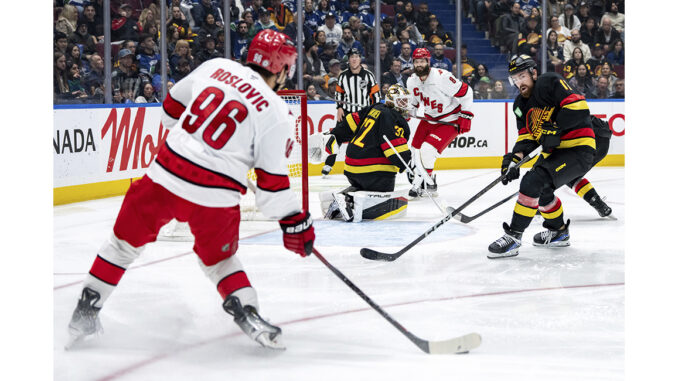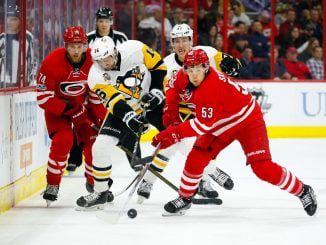
RALEIGH — Despite consistently being one of the NHL’s top teams over the last handful of years, the Hurricanes have shocked the league with their 9-2-0 start. While many expected Carolina to take a step back after reloading their roster after an offseason of key departures, the Hurricanes have instead been the best team in the Eastern Conference and, after Sunday’s win over the Capitals, winners of six straight.
Jack Roslovic has been a big part of that. The versatile 27-year-old forward is an early Cy Young candidate (seven goals, no assists, mimicking the records of baseball’s top pitchers) and has worked his way onto Carolina’s top line, allowing Seth Jarvis to move back to Jordan Staal’s wing to add some scoring punch to the Hurricanes’ best checking line.
The partnership could have never been had Roslovic been signed early in free agency. After a couple of days on the market, the Hurricanes pounced, getting the half-point-per-game veteran on a one-year deal worth $2.8 million.
He’s earned his money so far, which has led to calls for Carolina to quickly re-sign Roslovic to a contract extension before his value goes through the roof.
We’ve seen this before.
At the 2018 NHL Draft, the Hurricanes made a blockbuster move, trading Elias Lindholm and Noah Hanifin — both former fifth-overall picks — to the Flames for Dougie Hamilton, Micheal Ferland and Adam Fox.
Hamilton was the best player among the pieces Carolina received, while Fox was considered an elite prospect who would later make good on pundits’ claims that he could one day win a Norris Trophy.
Ferland brought a different element: a ferocious physical force who could alter games with his hits and fists while also contributing offensively.
Ferland came out of the gates strong for the Hurricanes, scoring six goals with four assists in his first 10 games.
Furthermore, he was a wrecking ball. On Oct. 20, 2018, in Colorado, he blew up Tyson Jost — currently on a contract with Carolina and playing in the AHL — with a big hit and then pummeled Erik Johnson when the former No. 1 overall pick came in to defend Jost.
People, naturally, quickly fell in love with Ferland. On the final year of his deal, Ferland and his agent were looking to cash in on an extension that looked similar to ones previously signed by Kyle Okposo (seven years, $42 million), Andrew Ladd (seven years, $38.5 million) and even Evander Kane (seven years, $49 million).
Fans, enamored with a player unlike the team had ever seen since relocation to North Carolina, went into complete “give him whatever he wants!” mode.
The Hurricanes thought the structure should be closer to five years with an average annual value under $5 million.
Ferland, however, not only cooled off — he scored 10 goals in the next 59 games — but also started to struggle with concussions. By the time the NHL trade deadline rolled around, the Hurricanes had decided not to re-sign Ferland, though the team did keep him for the rest of the season.
He played in just seven of Carolina’s 15 playoff games, finishing with one assist and 16 penalty minutes — which included a match penalty in Game 2 of Round 1 against the Capitals for a hit on Nic Dowd — and ended up signing a four-year deal with the Canucks worth $14 million.
Unfortunately for Ferland, his concussion issues continued, and he played just 14 games for Vancouver before ending his playing career.
The Hurricanes used some of the money left over from not re-signing Ferland that summer to swing a trade with cap-strapped Vegas for Erik Haula, who was in the final year of a deal that paid him $2.75 million annually.
At the start of the 2019-20 season, Haula had seven goals and an assist in his first nine games, again leading to fans claiming it was a no-brainer to get Haula signed to an extension immediately.
After a nine-point October, Haula had 12 points in his next 29 games with the Hurricanes, and the two sides soured on each other before he was traded at the deadline to the Panthers in a package that brought Vincent Trocheck to Raleigh.
He’s since become Public Enemy No. 1 whenever he comes back as a visiting player due to his play on the ice, comments off the ice and a string of playoff series against the Hurricanes with Nashville, Boston and New Jersey — all Carolina wins.
Roslovic may prove to be a long-term answer in the Hurricanes’ top nine, but as history has shown, the first month of the season shouldn’t be the determining factor in such a decision. Furthermore, Carolina couldn’t extend him until Jan. 1 even if they wanted.
Roslovic isn’t going to continue to score on 22.2% of his shots (11.7% coming into this season)‚ and he’s also not going to go all season without an assist (0.32 assists per game).
The Hurricanes and Roslovic need only one thing to determine if their relationship should extend beyond this season: time.



